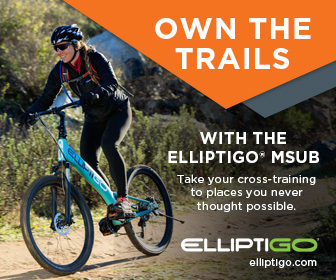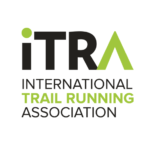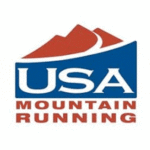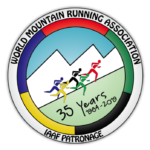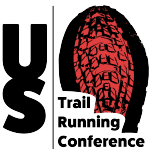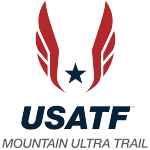
The Happy Runner, by David and Megan Roche, MD. Human Kinetics, 2019. Reviewed by Laura Clark. Laura is an avid mountain, trail and snowshoe runner who lives in Saratoga Springs, NY, where she is a children’s librarian. David & Megan pictured above at the 2017 Trail World Championships.
Every runner has the same finish line: death.
You have seen photos of exuberant runners crossing under the finish line banner, broad smile, arms raised in victory. But what about those same runners captured mid-race, trudging upwards, that much closer to the next thunderstorm? Probably not so much. Except for stature, we resemble Grumpy attacking yet another day at the mines. In fact, that standard Grumpy photo could be one of the top reasons for running avoidance. It simply doesn’t look like fun.
Enter David Roche – 2014 USATF sub-ultra Trail Runner of the Year, two-time national champion and three-time member of Team USA – and his wife Megan – 2016 USATF Trail Runner of the Year at the ultra and sub-ultra distances, five-time national champion, and a six-time member of Team USA – and their smiley-faced book, The Happy Runner. SWAP Team coaches (Some Work, All Play), they work their way back from everyone’s ultimate finish line, encouraging their athletes to take the longer view. Rather than focusing entirely on a definitive goal event, they operate more on a multi-year approach, where process and satisfaction are the ultimate rewards.
How many times have you achieved a race breakthrough, an amazing course grade or a community award, only to experience a vague sense of unease and a compulsive urge to set your sights even higher? Rather than savoring the moment which was supposed to bring ultimate satisfaction, you acknowledge it with a fleeting nod and are off on the treadmill once again. The authors’ outlook reminded me of mindful running with a bonus factor. And that extra can be summed up in one word: gratitude for the space you are in. One of our first Northeast Snowshoe race directors, known for his difficult romps up and down Mt. Greylock, the highest mountain in Massachusetts, always reminded us to take a moment at the top to savor the view. Sure enough, midway, he kept his famous grin intact. And while this book is directed towards runners, it applies to anyone who has a tendency to let life’s “challenges” “overwhelm the enjoyment of life itself.

The text is a delight, with smoothly flowing prose and a knack for startling phrases (“Every runner has the same finish line: death”) and frequently humorous clips (“People talk about time being short, but it really isn’t in the moment. If you want proof, go get your car registered at the DMV”). To underscore their philosophy, the Roches cite examples of breakthroughs experienced by some of the famous and the ordinary athletes they coach. While these are necessarily shortened versions, if you are interested in immersing yourself in a more detailed journey, I urge you to read Emelie Forsberg’s book, Sky Runner: Finding Strength, Happiness and Balance in Your Running. While she doesn’t coach Emelie, Megan commented that their viewpoint and even some of their workouts are similar!
The only roadblock I encountered is the fact that the book is written jointly. While the authors explain upfront that David will report Megan’s experiences and Megan will do the same for David, there also seems to be a middle narrator whose role isn’t as clearly defined. At first I got distracted trying to figure out who was doing the commentary, but after a while decided it didn’t really matter and just chalked it up to a husband/wife “we.”
I progressed through warm fuzzies and wagging dog tails (courtesy of their designated companion, Addie dog), until the final third of the book which delved into, of all things: the dreaded training plans. At my stage in life I figured not much besides a new body would be of any help. I was resigned to tiptoeing through the tulips, enjoying the experience, but that was about it. According to the Roches, what I need return spring to my step is to incorporate short strides into the final third of my easier runs. They promise that improving speed will make every pace feel easier. One week in and quantitative measurements are not possible, but I must say that my recommended easy runs are fraught with more purpose and a deeper feeling of accomplishment. The verdict is still out, but the mental lift without the wear and tear of a lengthier speed session is a definite winner.
With a mix of unconditional self-acceptance and self-belief, anything is possible. And while you may not actualize your dream goal, you will get farther than you would have thought possible!
“The Happy Runner” is all about zooming out and finding a framework for unconditional self-acceptance in your running life. PLUS AN ALL-CAPS TALKING DOG. And it’s shipping now! We are so thankful for all of you 😍 Order link: https://t.co/OlxdA7o7zN pic.twitter.com/OMI192A3u8
— David Roche (@MountainRoche) November 23, 2018


